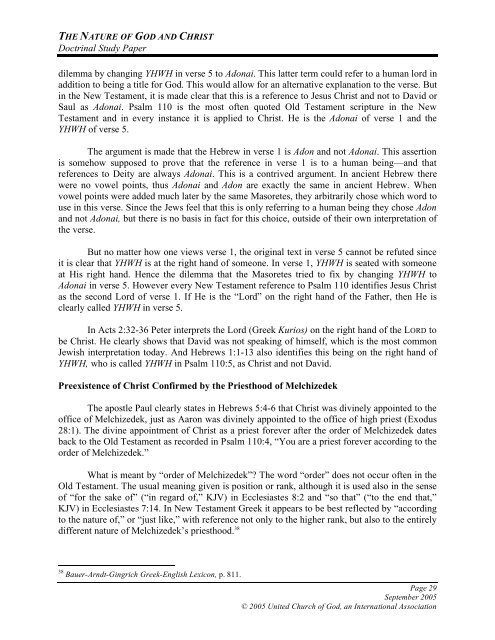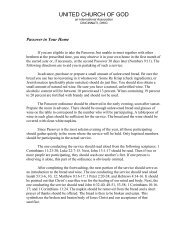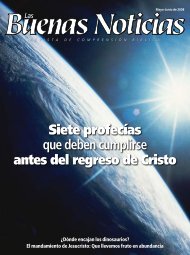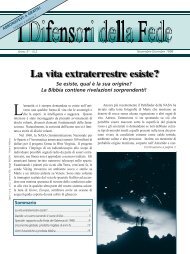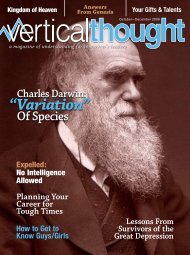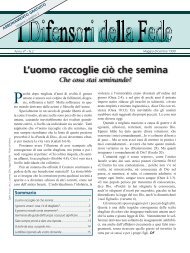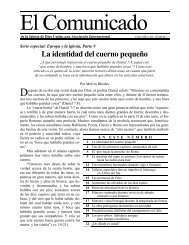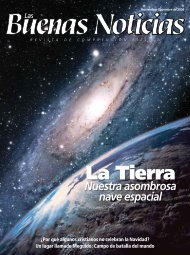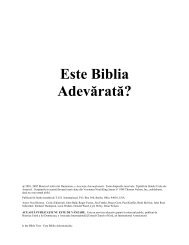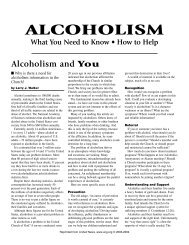The Nature of God and Christ - Members Site - United Church of God
The Nature of God and Christ - Members Site - United Church of God
The Nature of God and Christ - Members Site - United Church of God
- No tags were found...
Create successful ePaper yourself
Turn your PDF publications into a flip-book with our unique Google optimized e-Paper software.
THE NATURE OF GOD AND CHRISTDoctrinal Study Paperdilemma by changing YHWH in verse 5 to Adonai. This latter term could refer to a human lord inaddition to being a title for <strong>God</strong>. This would allow for an alternative explanation to the verse. Butin the New Testament, it is made clear that this is a reference to Jesus <strong>Christ</strong> <strong>and</strong> not to David orSaul as Adonai. Psalm 110 is the most <strong>of</strong>ten quoted Old Testament scripture in the NewTestament <strong>and</strong> in every instance it is applied to <strong>Christ</strong>. He is the Adonai <strong>of</strong> verse 1 <strong>and</strong> theYHWH <strong>of</strong> verse 5.<strong>The</strong> argument is made that the Hebrew in verse 1 is Adon <strong>and</strong> not Adonai. This assertionis somehow supposed to prove that the reference in verse 1 is to a human being—<strong>and</strong> thatreferences to Deity are always Adonai. This is a contrived argument. In ancient Hebrew therewere no vowel points, thus Adonai <strong>and</strong> Adon are exactly the same in ancient Hebrew. Whenvowel points were added much later by the same Masoretes, they arbitrarily chose which word touse in this verse. Since the Jews feel that this is only referring to a human being they chose Adon<strong>and</strong> not Adonai, but there is no basis in fact for this choice, outside <strong>of</strong> their own interpretation <strong>of</strong>the verse.But no matter how one views verse 1, the original text in verse 5 cannot be refuted sinceit is clear that YHWH is at the right h<strong>and</strong> <strong>of</strong> someone. In verse 1, YHWH is seated with someoneat His right h<strong>and</strong>. Hence the dilemma that the Masoretes tried to fix by changing YHWH toAdonai in verse 5. However every New Testament reference to Psalm 110 identifies Jesus <strong>Christ</strong>as the second Lord <strong>of</strong> verse 1. If He is the “Lord” on the right h<strong>and</strong> <strong>of</strong> the Father, then He isclearly called YHWH in verse 5.In Acts 2:32-36 Peter interprets the Lord (Greek Kurios) on the right h<strong>and</strong> <strong>of</strong> the LORD tobe <strong>Christ</strong>. He clearly shows that David was not speaking <strong>of</strong> himself, which is the most commonJewish interpretation today. And Hebrews 1:1-13 also identifies this being on the right h<strong>and</strong> <strong>of</strong>YHWH, who is called YHWH in Psalm 110:5, as <strong>Christ</strong> <strong>and</strong> not David.Preexistence <strong>of</strong> <strong>Christ</strong> Confirmed by the Priesthood <strong>of</strong> Melchizedek<strong>The</strong> apostle Paul clearly states in Hebrews 5:4-6 that <strong>Christ</strong> was divinely appointed to the<strong>of</strong>fice <strong>of</strong> Melchizedek, just as Aaron was divinely appointed to the <strong>of</strong>fice <strong>of</strong> high priest (Exodus28:1). <strong>The</strong> divine appointment <strong>of</strong> <strong>Christ</strong> as a priest forever after the order <strong>of</strong> Melchizedek datesback to the Old Testament as recorded in Psalm 110:4, “You are a priest forever according to theorder <strong>of</strong> Melchizedek.”What is meant by “order <strong>of</strong> Melchizedek”? <strong>The</strong> word “order” does not occur <strong>of</strong>ten in theOld Testament. <strong>The</strong> usual meaning given is position or rank, although it is used also in the sense<strong>of</strong> “for the sake <strong>of</strong>” (“in regard <strong>of</strong>,” KJV) in Ecclesiastes 8:2 <strong>and</strong> “so that” (“to the end that,”KJV) in Ecclesiastes 7:14. In New Testament Greek it appears to be best reflected by “accordingto the nature <strong>of</strong>,” or “just like,” with reference not only to the higher rank, but also to the entirelydifferent nature <strong>of</strong> Melchizedek’s priesthood. 3838 Bauer-Arndt-Gingrich Greek-English Lexicon, p. 811.Page 29September 2005© 2005 <strong>United</strong> <strong>Church</strong> <strong>of</strong> <strong>God</strong>, an International Association


